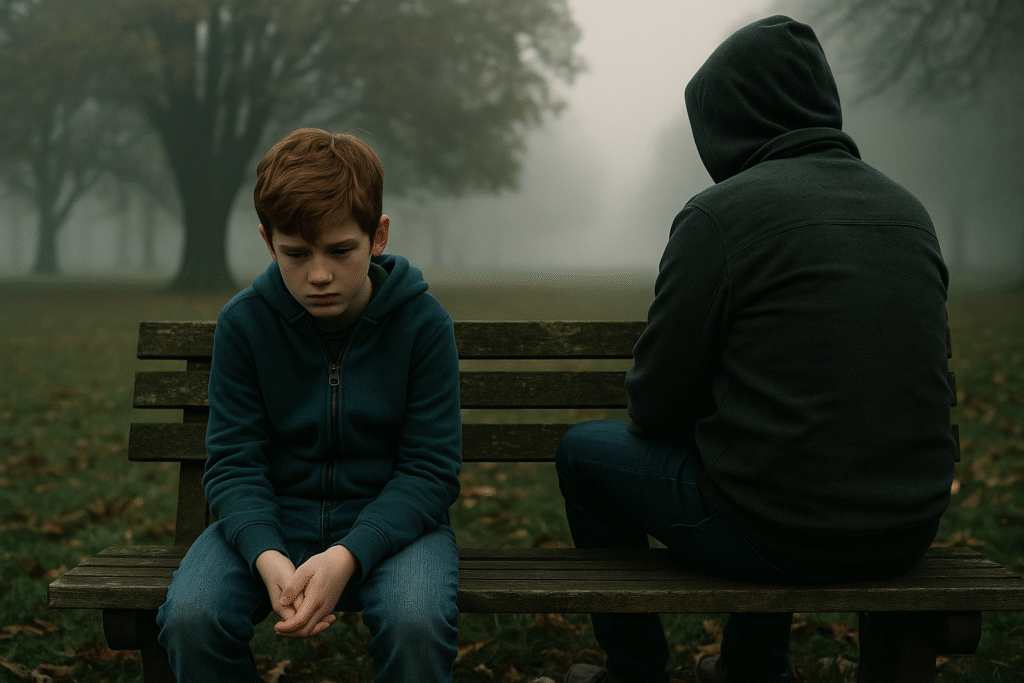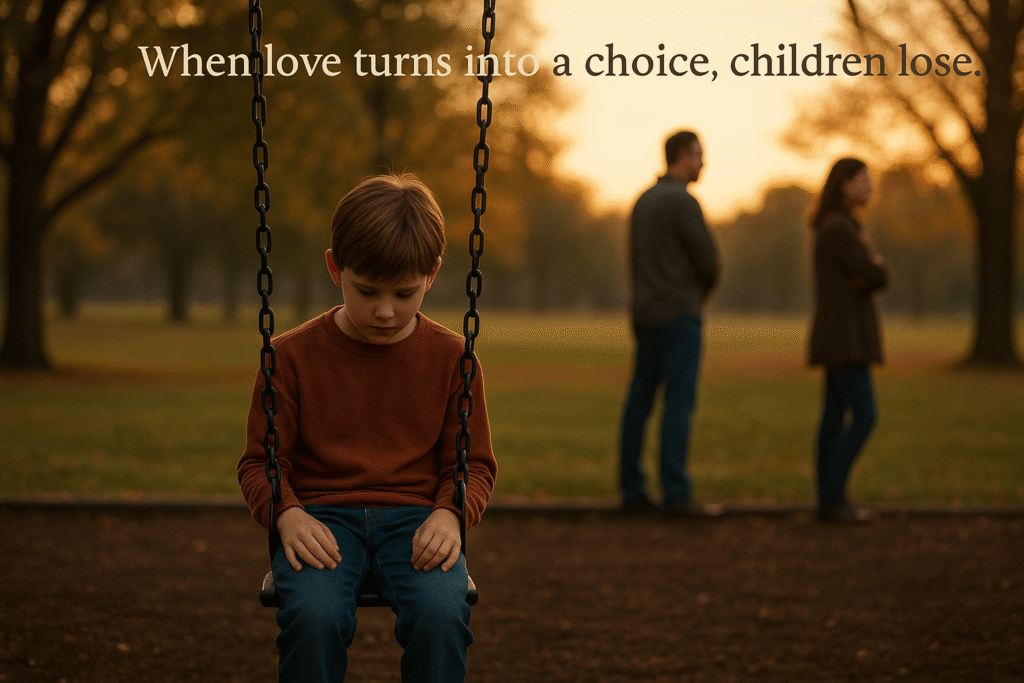Understanding the emotional storms of boys aged 10–13, and how to show up when it matters most
Introduction
Just when you begin to feel that, finally, you understand how to be the parent your son needs—that you’ve built a relationship based on warmth, play, laughter, trust—something shifts. Almost overnight, the boy who once curled into you after school, who sought your kisses like oxygen, who asked a hundred questions before bedtime and declared his love with sticky fingers and bright eyes, begins to retreat. His “I love you” becomes a shrug. His embrace stiffens. His eyes dart away. And then, one day, he says it: “Leave me alone!”
For many parents, especially mothers, this moment lands like a slap—unexpected, sharp, and confusing. And for educators, who may have known him as a curious, talkative, eager student, the sudden change in behavior can feel just as unsettling. The truth is, the boy is not trying to be difficult, distant, or cold. He is becoming. And that becoming—mysterious, raw, full of tension—is what we are here to understand.
Because what we often miss, beneath the eye rolls, silence, sarcasm, or shut doors, is not defiance. It’s disorientation.
Let us slow down enough to see it.
I. What Early Puberty Actually Looks Like (And Why It’s Easy to Miss)
When we think of puberty, we often imagine visible, physical markers: the cracking of the voice, the growth of body hair, the sudden change in height. But the first seismic shifts in a boy’s development begin quietly, long before the world around him notices. And perhaps the most powerful of these changes happen not in the mirror—but in the mind.
Between the ages of ten and thirteen, a boy’s brain begins a major reconstruction project. The emotional center—his amygdala—fires with more intensity, while the part of his brain responsible for impulse control, emotional regulation, and clear decision-making—his prefrontal cortex—is still under construction. What this means is heartbreakingly simple: he begins to feel more than he knows how to name, to want more than he understands, to react with more heat than he can control.
He’s not overreacting.
He’s overflowing.
And because the physical signs of puberty might not yet be visible to you—or even to him—his behavior is often misunderstood. He is mistaken for lazy, rude, dramatic, avoidant. When in truth, he is simply lost in a new internal world, one where the rules have changed and no one gave him a map.
II. When Anger or Silence Arrives at the Dinner Table
Some boys express this inner upheaval in sharp tones and hard words—“Why are you always on my back?” “I said I’m FINE.” Others simply go quiet, their gaze distant, their answers clipped. And some shift between both, depending on the hour or who is in the room.
It’s tempting, as adults, to correct this behavior immediately—to scold, to interpret it as disrespect, to reach for consequences. But what he often needs most in these moments is not punishment. It’s translation.
He needs you to see that the anger is not about the dishes. That the sarcasm isn’t truly about the homework. That the silence is not indifference, but a sign that something inside him is too tender—or too tangled—to bring into words.
What might help:
- Refuse to take it personally. When he lashes out or shuts down, remind yourself: “This is not about me. It’s about what he’s carrying.”
- Give him the words he lacks. Try: “You seem upset—do you want to talk, or just sit quietly for a bit?”
- Stay present without pressure. Sometimes, the kindest thing you can do is sit beside him while he plays a video game, read in the same room, or simply let him know: “I’m here when you’re ready.”
The goal is not to fix him, but to remain close enough that he never feels he must face his hardest moments alone.
III. Belonging or Breaking: What Social Pressure Really Feels Like
By the time a boy reaches middle school, belonging becomes a matter of survival. Being accepted—or rejected—by his peers carries emotional weight he cannot yet articulate. One moment, he might be desperate to impress the older boys by copying their jokes or style. The next, he might be devastated because he wasn’t invited to sit at a certain lunch table.
To adults, this may seem trivial. But to him, it is existential.
And in this landscape of shifting power, status, and performance, many boys begin to lose themselves trying to fit in. Some become louder, more aggressive, mocking others before they can be mocked themselves. Others disappear into the background. And some turn to YouTube, video games, or even pornography—not out of rebellion, but out of a frantic need to understand who they are, and what being “a man” is supposed to mean.
What might help:
- Don’t wait for him to ask. Open conversations about identity, peer pressure, and what real friendship looks like—even if he rolls his eyes.
- Normalize curiosity. Talk calmly about bodies, sex, and consent without shame, even if it’s awkward. He will remember your tone more than your exact words.
- Help him reconnect to his true interests. Remind him that he is more than what his peers admire—and show him environments where his real self is seen and welcomed.
IV. The Sudden Discomfort With Affection—Especially From Mom
Perhaps the most heartbreaking change comes in how he responds to love. The boy who once melted into your arms now stiffens when you reach for a hug. He no longer holds your hand. He pulls away when you touch his hair. The affection that once made him feel safe now feels, somehow, threatening.
And while he may still adore you deeply, his instinct now is to create distance—to protect the fragile scaffolding of independence he’s trying to build.
What might help:
- Shift how you express love. Instead of a kiss on the forehead, try a high-five, a casual “You crushed it today,” or a light hand on his back as he walks past.
- Respect the boundary, without abandoning affection. Make it clear: “I love you just as much, even if we’re showing it differently these days.”
- Let other trusted adults step in. A father, grandfather, coach, uncle, or teacher might now be the person he leans toward emotionally—and that’s okay.
He’s not rejecting you. He’s rewriting his story. You’re still in it—just on a different page.
V. When Friendships Fade or Fracture—and He Has No Words for the Grief
At this age, friendships change—and often hurt. The boys he played with for years might now ignore him. A friend who used to sleep over every weekend might suddenly act cold. He may experience teasing, exclusion, betrayal—or become the one who excludes others.
And because boys are rarely taught to talk about relational pain, he may bury the heartbreak. He may say “I don’t care.” He may pretend it doesn’t matter. But you’ll notice the way he closes in on himself, or the flicker of shame in his voice.
What might help:
- Don’t dismiss it. Avoid phrases like “You’ll make new friends” or “It’s not a big deal.” Say instead, “That sounds really painful. I’m here if you want to talk.”
- Teach him how friendships evolve. Let him know that it’s normal for relationships to change—and that growing apart doesn’t mean he did something wrong.
- Model emotional repair. Share stories from your own life about forgiveness, boundaries, or letting go. Give him language for something he doesn’t yet know how to feel.
VI. Knowing When to Stay Steady—and When to Step In
Most of what boys experience at this age is normal—even if confusing, messy, or emotionally volatile. But sometimes, there are signs that a boy is not just struggling—but suffering.
Red flags include:
- Persistent sadness or irritability that lasts more than two weeks
- Social isolation with no signs of reengagement
- Frequent talk of worthlessness, self-hatred, or hopelessness
- Aggression, self-harm, or risk-taking behavior
- Sudden drop in grades or school engagement
If you see these signs, trust your instincts. Speak with a school counselor, therapist, or pediatrician. Getting support early can change everything.
Final Words: He’s Not Lost—He’s Becoming
It’s not easy to adjust to this new version of your son—especially for mothers, who often feel the shift most deeply. The closeness you once shared, the warmth he welcomed so easily, now meets resistance. He pulls away. He rolls his eyes. He stiffens at affection. And while it may feel like rejection, it is, in truth, a sign that he is changing. And like every previous stage of his growth—from baby to toddler, from child to pre-teen—this one, too, asks you to adapt.
Supporting boys through puberty is not just about managing moods or monitoring schoolwork. It’s about learning how to meet them where they are: emotionally overwhelmed, developmentally disoriented, and often unable to explain what they’re feeling. Between the ages of 10 and 13, boys need more than discipline or advice. They need presence. They need adults who stay close even when words are few, who offer safe space without pressure, and who make room for the storm without trying to stop it.
This is also a time when boys need their fathers—or strong male role models—more than ever. The emotional development of boys during early adolescence is shaped not only by maternal care, but by consistent, emotionally available male presence. Studies show that boys with engaged fathers or male mentors tend to have stronger emotional regulation, higher self-esteem, and better social resilience. They need to see a version of manhood that is grounded, kind, and calm. They need someone who can say, through quiet example, “I’ve been here too—and you’ll find your way.”
If a father is absent, that role can be filled by a coach, a teacher, an uncle, or a trusted family friend. What matters is not the title, but the tone: someone steady, respectful, and emotionally fluent enough to model how a boy can grow without shutting down who he truly is.
So yes—this stage is uncomfortable. Yes—it’s confusing. But it is not a crisis. It is a crossing.
And the way we walk with him now—without panic, without judgment, without withdrawing when he pushes—will leave a lasting imprint far deeper than any advice ever could.
Because one day, long after this stretch of puberty has passed, your son won’t remember every detail of the arguments or silences.
But he will remember how it felt to be seen.
To be accepted in his most unlovable moments.
To be loved, even while he was still becoming.
And that memory—that grounded emotional connection—is what will help him grow not just into a man, but into a whole one.



